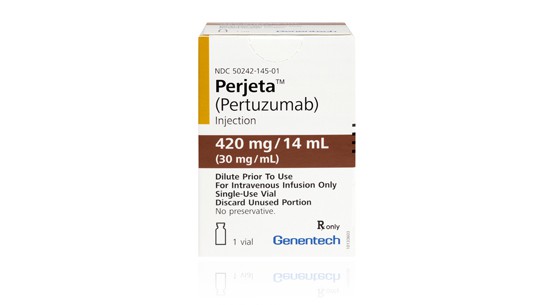
Roche’s new oncology drug Perjeta (pertuzumab) has been approved by the European Commission to treat certain breast cancer patients when used in combination with its ageing drug Herceptin (trastuzumab).
Specifically, the EC has approved the two medicines, to be used alongside chemotherapy, for the neoadjuvant treatment (use before surgery) of adult patients with HER2-positive, locally advanced, inflammatory, or early stage breast cancer at high risk of recurrence. This follows its US approval for the same licence in 2013.
Every year in Europe nearly 100,000 people are diagnosed with HER2-positive breast cancer, an aggressive type of the disease that is more likely to progress than HER2-negative cancer.
Treating people with breast cancer early, before the cancer has spread, may improve the chance of preventing the disease from returning.
This builds on Perjeta’s other EU licence that, when combined with Herceptin and chemotherapy, is also approved for patients with HER2-positive metastatic or locally recurrent breast cancer that cannot be operated on.
Sandra Horning, Roche’s chief medical officer and head of global product development, said: “[This] approval is a significant milestone in the neoadjuvant treatment of HER2-positive early breast cancer, bringing Perjeta to patients years earlier than typical adjuvant treatment.
“We are committed to making the Perjeta regimen available to appropriate patients in the EU as early as possible.”
Analysts have predicted sales of Perjeta could reach $600m to $1bn within the next five years, helping to alleviate the impact of generic competition to Herceptin, which began to lose patent protection in 2014.
However, the high cost of Perjeta plus Herceptin – about $188,000 for a standard 18-month treatment – could limit its use in European countries implementing austerity measures in healthcare.
The drug was rejected by England’s drug pricing watchdog NICE last year, with the Institute saying the medicine’s £90,000 price tag was nearly double the price it need to be in order for the NHS to be able to fund it.




